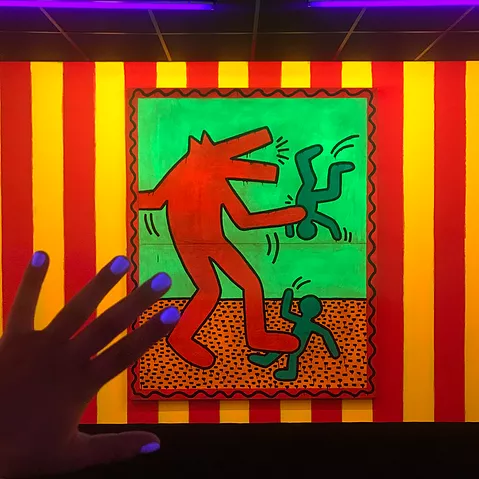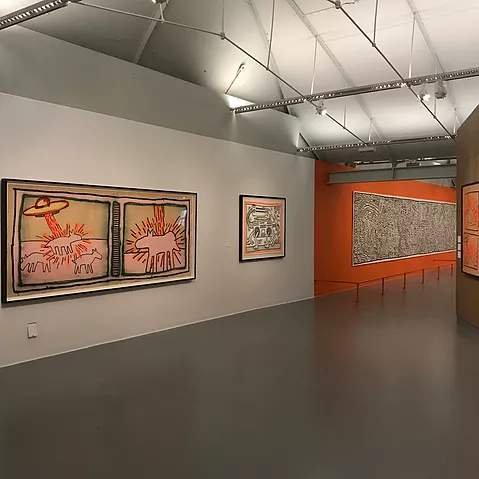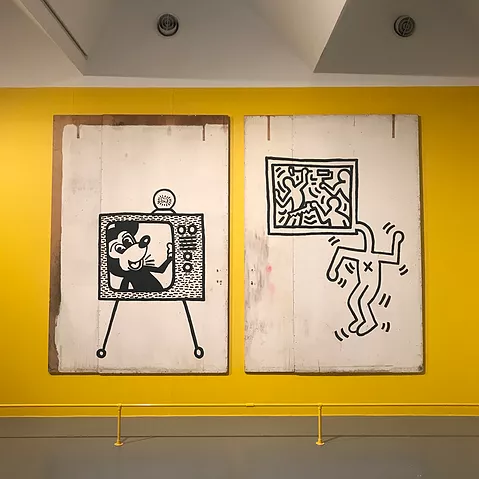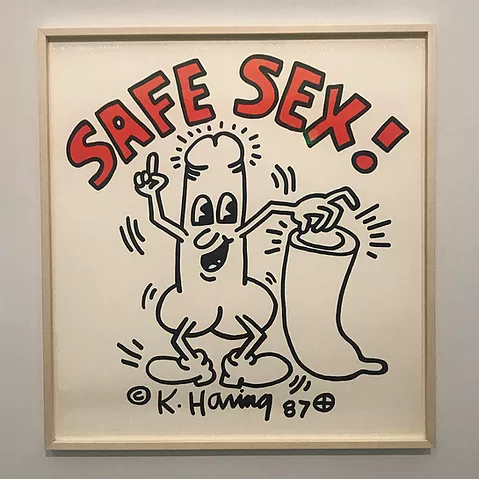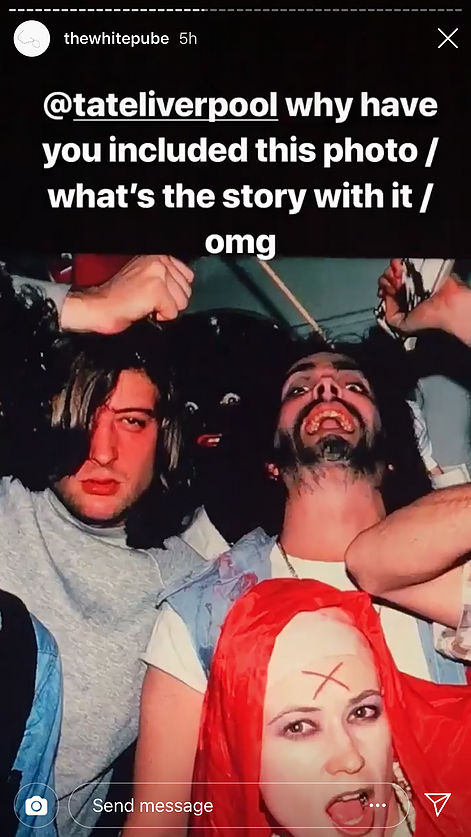Keith Haring @ Tate Liverpool
GDLP
Emoji summary: 👼🏻🔺👽
it sometimes feels like a sort of privilege to visit an exhibition by someone mega famous whose work and life I know nothing about. I exist, i went all the way through art school and out the other end / spend time on the internet and in galleries, watch documentaries, listen to podcasts every week, and yet i knew nothing substantial about Keith Haring until i visited the new exhibition of his work that opened a few days ago @ Tate Liverpool. I say I knew *nothing* but I had seen his work on uniqlo t-shirts, knew he was white and looked a bit like Zach out of the Try Guys. thought he might have been from new york?? and could identify that he was the one who drew black outline shapes and figures, all colourful and blocky. Whatever tho. Cultural/class pressure to know the ins and outs of everyone in the canon doesn’t get to me like it used to, but the hype built around this show coming to liverpool did intrigue me bc it’s not often an artist has actual stans, is it? I went to the press preview the other day 2 look inside / or to encounter what it was the curators wanted me to see and think and feel. I’m now like, semi annoyed or something.
There’s a lot of work in the show, which is kudos to the man himself for being prolific in his output but also to his museum and everyone who has worked to collect and preserve these big bright drawings he made. being so un-inducted, i was grateful for the full run down; glad to see how his work went from boring abstract stuff, to graffiti on the subway and cartoons and big big drawings capturing different energies like life itself, a fear of nuclear, digital, aliens and so on. I also enjoyed the amt of archive film, bc it really does go a way towards paintin a picture of the time in which he was making. Like, it was nice to see him riding a bike around a gallery, and i watched it wishing Tate was louder and freer and more relaxed bc the formal behaviour this institution expects doesn’t really align with the artist inside its walls right now. But anyway, I liked that constant swinging from optimism to fear in what he made; and that, because of his foundation in drawing (his dad was a cartoonist), he was able to stretch the medium to make it do whatever he wanted. he could celebrate with his ‘radiant babies,’ give us a kind of shivering and nervousness about what the future might hold, or apply a more straightforward activism in posters about the AIDS crisis promoting safe sex. This is the way the show ends, with his life. Keith Haring died at only 31 from AIDS-related complications. In the exhibition, there is footage from ACT UP’s Ashes Action protest where campaigners poured the ashes of those who had died from AIDS through fences onto the White House lawn; and also there is work by Haring on how silence = death, and national coming out day. it feels like the right way to close the exhibition, and i was just kind of amazed realising how much he achieved in such a short amount of time.
So, okay. He seemed like a nice guy, tragic death, and yet the art feels light and easy on the eyes; LGBT+ representation, v good summer exhibition for the kids and marketable too. but ultimately i felt the same way here as I did after visiting the john walter exhibition at HOME in manchester earlier this year, which is to say: so much of this artist’s style has been taken from artists of colour, who walked so people like Haring could fully leg it towards success. There are parallels between these 2 artists in the appropriative style in which they have made work, but also the subject in part being HIV, AIDS, politics and scientific research. That politic shouldn’t stop us being allowed to talk about race, their intersection and the art being produced, but with the way this exhibition is curated you would think it does. I was also at the press preview tbf and it was just like old friends, family and fans gathering to reminisce about how much Haring achieved, and maybe that wasn’t the time or place for a conversation on the limits of his work or where it might have gone wrong, but i guess that’s why I’m writing this text. I would have expected (and hoped and prayed) that the curation would have laid this out for us and paid tribute to the marginalised artists who came before Haring, you know, everyone who was not allowed to succeed in the way he did. but there was hardly any mention, and when wall texts did describe ‘influences,’ they were not given any real weight. I think it should have been more visible, because a better understanding of how and where he used appropriation and even bringing those sources into the room would have been fairer to black / asian and hispanic artists, and would have made for a better exhibition imo. In one of the films he calls his work ‘modern hieroglyphics’ - can’t the curators expand on that? I felt like everyone in the room at Tate was just gathered to celebrate an old friend and icon, so I had to be quiet about these questions I had. i say quiet but i dunno if speaking to 25 thousand people on instagram counts, i was sharing everything i saw online in real time. a follower, Tabantha Gonzalez, replied to one of my instagram stories to say, ‘if you look at his early work and then this, it completely derives from south american/Caribbean molas which have been made by women for so long and then a white man steals the ideas and he becomes a famous artist. I never understood why curators feel no responsibility in addressing the roots from which appropriated art comes from. It’s like they feel the need to preserve the artists identity so badly that they don’t want to lift the curtain.’ historical exhibitions can also be reparative and it would have been good for Tate Liverpool to have taken a position on this instead of just playing it nice (because playing it nice is actually harmful if you haven’t realised already). imagine if this was a show that had done more.
Maybe the curators weren’t interested, and then maybe they didn’t realise. Again, at the press preview the morning before it opened to the public, i was stood on my bill watching some club night photos rolling on TV screens showing that network of friends and celebs Haring was a part of, and included in the photographs was a group of people stood posing with somebody in blackface between them smiling big. I added it to the instagram story to be like wtf but also ?why? Not that there should be room for that conversation, like it’s not a debate, but i had this small moment of fear and giving them the benefit of the doubt, worried my call-out would reveal some ignorance on my part (maybe it was an ironic performance by a famous black artist, and i was stupid for not already knowing or something and the Tate would embarrass me - i don’t know). An hour later, by the time I got to the free lunch for press visitors, the tate director informed me the photograph had been removed and that it was Tate embarrassed about the incident. I feel flummoxed because I don’t know how curators, assistants, the keith haring museum, the technicians, or just anyone who stood before that work when it was being installed didn’t notice that someone was in blackface. like how many people missed that (and how many noticed and didn’t speak up?). you have to laugh. astounds me. I think there are two people of colour working at Tate Liverpool that aren’t cafe/cleaners/security. So you know, maybe that answers the question of how this was allowed to happen. and I don’t want to end this by asking the Tate to be more vigilant, because that’s not it - I want them to be less white, that’s all. i will be interested to read other reviews or hear from fans of his work about what they think of the exhibition. And it’s worth saying i’m glad there is such a big LGBT+ focused public programme running alongside this, but that i hope it sticks and it’s not just Tate’s regular diversity tick-box summer show and bad business as usual.
